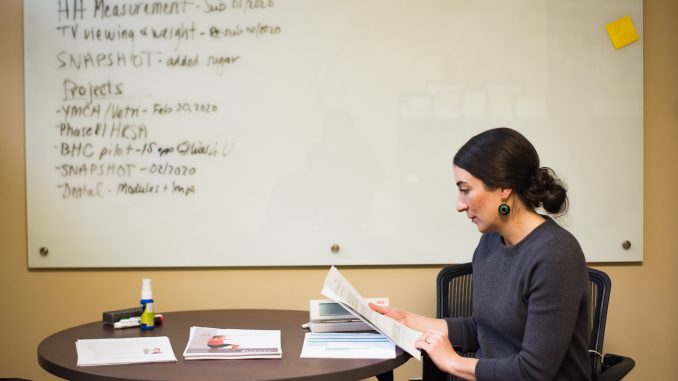
Half of the schools nationwide require K-8 students to receive nutrition education. Only 40 percent of ninth and 10th graders and 20 percent of 11th and 12th graders have these requirements, according to the National Center for Education Statistics.
To help provide more of this education locally, Gina Tripicchio, a social and behavioral science professor, helped create an after-school cooking program for students at the Columbia North YMCA on Broad Street near Master. The free classes are a collaboration with the Office of Community-Engaged Research and Practice at Temple University, a partnership between Temple, local organizations and community members, and the Vetri Community Partnership, a community health programming initiative.
In September 2019, 15 children aged 8-12 attended the 10-week course where they learned about healthy cooking and nutrition. This semester, the second session started on Feb. 27 and teaches teenagers cooking skills.
Learning how to cook is an easy skill for kids to grasp and share with others, Tripicchio said.
“Rather than being like, ‘Here’s what a carbohydrate is’ or ‘Here’s what you should eat,’ cooking is a really hands-on, applied way to learn, and it’s also a skill that kids can use over and over again,” she added.
The program was created after the North Columbia YMCA reached out to the Office of Community-Engaged Research and Practice about creating new programs for students there, Tripicchio said. She was immediately interested in creating a collaboration to benefit the North Philadelphia community.
The classes are taught by Katie Green, Vetri Community Center cooking instructor at the Stephen Klein Wellness Center on Cecil B. Moore Avenue near 22nd Street. Volunteers from Temple, like Danielle Gartner, a senior public health major, and Sara Kovacs, a kinesiology professor, help her with instructions.
Green asks students if they made any of the recipes at home, and some have, she added.
“They tried to make meals for their family for dinner,” Green said. “They all participated as a family which is really nice as well. It makes me happy to hear that. I even had one student say he’s going to be a chef when he grows up, which I would love to see that happen.”
Nutrition education is important to her because she sees a disconnect between younger people and understanding where their food comes from, Green added.
“They don’t think about if it’s really food or processed or genetically modified or full of pesticides or anything like that,” Green said. “I love that this class gets them thinking about where their food sources are coming from … because at the end of the day it affects their health long term.”
Khaleef Agbemehia, a 12-year-old student at Dr. Tanner G. Duckrey Public School, attended several classes and likes learning about new foods and techniques.
His favorite dish they cooked is broccoli tater tots, he said.
“I don’t really like broccoli, but that tasted good,” he added.
Gartner taught mini-lessons to students about macronutrients, like carbs, fats and proteins. She took for granted her knowledge and access to food as a child, and enjoys being able to provide education and empowering kids through food, she said.
Kovacs also helps assist Green in the classroom. Some of her favorite dishes the kids cooked are cauliflower fried rice, homemade breakfast sandwiches and rainbow egg rolls.
Students seemed to be inspired to help their parents more in the kitchen and were excited to show whoever picked them up what they cooked that day, Kovacs said.
“They wanted [their parents] to try the food they made that day so I think by offering them the opportunity to not only learn but have a skill that they could take home and show other people,” Kovacs added. “I think that they really enjoyed that component.”
Tripicchio hopes that in the future, the groups will be able to run two sessions at a time — one for younger students and one for older students. It has been rewarding for her to see that the model they created for these classes is sustainable, she added.
“It was great to bring awareness to some of the resources that are in North Philadelphia for people who live, work and play there to know that these things exist and there are opportunities for them to be engaged in healthy lifestyles,” she said.



Be the first to comment